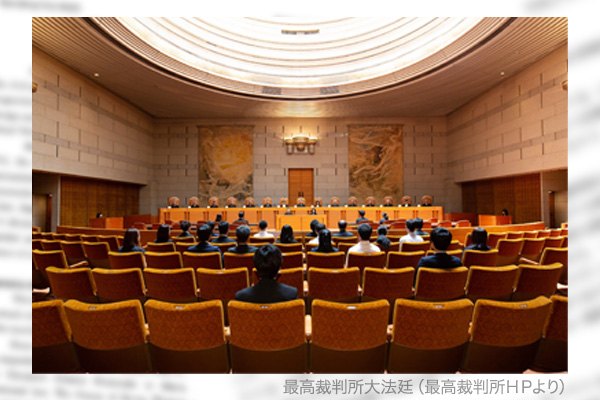On June 23, Japan’s Supreme Court ruled that the Civil Code’s Article 750 stipulating "a husband and wife shall adopt the surname of the husband or wife in accordance with that which is decided at the time of marriage" does not run counter to the constitution. The ruling thus rejected the proposed optional separate surname system allowing a husband and a wife to choose their respective pre-marriage surnames for the family registration.
A majority opinion of the top court’s 15-justice Grand Bench upheld its ruling on December 16, 2015, saying, “The issue of what system about the surnames of married couples is appropriate as a legislative policy is quite different from the issue of whether the current legal provisions for the same surname system run counter to Article 24 of the constitution and are invalid.”
Source of marital bond and family unity
Four out of 15 Grand Bench justices ruled the Civil Code article runs counter to Article 24 of the constitution providing for marital freedom and the “essential equality of the sexes.”
Most of mass media came into line with the minority opinion, asking how many years would pass before couples get married in a manner they desire.
While the minority opinion cited changes in national awareness regarding the proposed optional surname system, the majority opinion said, “National awareness should be assessed, in principle, by the National Diet comprising elected lawmakers representing the people.” It added national awareness has not gone that far.
Proponents of the optional separate surname system assert that Japan is the only country having the same surname system in the world. But Japan’s same surname system is closely related to the family registration system that is not seen in Western countries. Japan’s family registration system is closely linked to national awareness supporting family unity. A husband and wife can feel their bond by using the same surname. Their children may have family identity by using the same surname. If a husband and wife have different surnames, their child’s surname will differ from either’s.
Resolve inconvenience from using birth names
If a husband and wife are required to use the same surname in all daily life scenes as in the past, those who changed surname by marriage, mostly women, may be disadvantaged. But anyone is now allowed to use his or her birth name in an increasing part of daily life scenes after marriage, indicating that the need for adopting the optional separate surname system may have declined. If there still remain some inconvenience from using birth names, the inconvenience should be reduced as much as possible. None needs to be stuck to surnames for family registration.
Proponents of the proposed optional separate surname system, represented by the minority opinion of the Supreme Court Grand Bench and mass media, are exaggerating the inconvenience of the family registration system despite the fact that anyone is usually allowed to use birth name.
Although the minority opinion in the Supreme Court and mass media urge the Diet to introduce the optional separate surname system, the Diet should fully discuss the advantages and disadvantages of the optional separate surname system and how to remove inconvenience with the use of birth names.
Katsuhiko Takaike is an attorney-at-law and Vice President of the Japan Institute for National Fundamentals.


